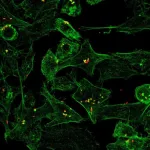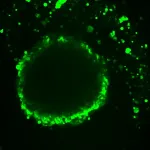(Press-News.org) LA JOLLA (June 23, 2023)—Worldwide, more than a million deaths occur each year due to diarrheal diseases that lead to dehydration and malnutrition. Yet, no vaccine exists to fight or prevent these diseases, which are caused by bacteria like certain strains of E. coli. Instead, people with bacterial infections must rely on the body taking one of two defense strategies: kill the intruders or impair the intruders but keep them around. If the body chooses to impair the bacteria, then the disease can occur without the diarrhea, but the infection can still be transmitted—a process called asymptomatic carriage.
Now, Salk scientists have found that pairing specific diets with disease-causing bacteria can create lasting immunity in mice without the costs of developing sickness, revealing a new potential vaccination strategy. Their findings, published in Science Advances on June 23, 2023, pave the way for the development of new vaccines that could promote immunity for those with diarrheal diseases and possibly other infections.
“We discovered that immunization against diarrheal infections is possible if we allow the bacteria to retain some of its disease-causing behavior,” says senior author Professor Janelle Ayres, Salk Institute Legacy Chair and head of the Molecular and Systems Physiology Laboratory. “This insight could lead to the development of vaccines that could reduce symptoms and mortality, as well as protect against future infections.”
In 2018, Ayres’ lab looked at how dietary interventions can create an asymptomatic infection, which Ayres calls a cooperative relationship between bacteria and host (the person or animal that the bacteria have infected) where the host does not experience any symptoms. They discovered that an iron-rich diet enabled mice to survive a normally lethal bacterial infection without ever developing signs of sickness or disease. The high-iron diet increased unabsorbed sugar (glucose) in the mice’s intestines, which the bacteria could feast on. The excess sugar served as a “bribe” for the bacteria, keeping them full and incentivized to not attack the host.
This process produced long-term asymptomatic infection with the bacteria, leading the researchers to believe that the adaptive immune system (cells and proteins that “remember” infections) may be involved.
“Being able to generate lasting immunity against bacteria like C. rodentium or E. coli has not been possible using established vaccination strategies. We wanted to figure out what mechanism was sustaining this lasting immunity, so we could use that mechanism to create an impactful solution to these diarrheal diseases,” says first author Grischa Chen, a former postdoctoral researcher in Ayres’ lab.
The researchers moved to figure out how the body suppresses infection symptoms, whether infection without symptoms can create long-term immunity, and whether that immunity is reproducible as a vaccination strategy.
The team compared mice with iron-rich and normal diets after C. rodentium infection to find whether the diet impacted symptomless infection. Immediately after infection, mice fed an iron-rich diet had no symptoms whereas mice fed a normal diet did have symptoms. All mice were then put on a normal diet to see whether the asymptomatic infection would last.
Mice with nonfunctional adaptive immune systems (the immune system that “remembers” previous infections), regardless of whether they had ever been on an iron-rich diet, could not continue to maintain a cooperative relationship with the bacteria. Although the iron-rich diet suppressed symptoms immediately after infection, the adaptive immune system was required for lasting cooperation. Importantly, the mice with functional adaptive immune systems had the disease without any symptoms, with lasting immunity, as demonstrated by survival upon reinfection after a month.
Ayres and team concluded that an iron-rich diet alone can prevent bacteria from creating deadly symptoms in mice during active infection. But a functional adaptive immune system is required for immunity against future infection in the absence of dietary supplementation.
Some bacterial strains, if mutated enough, don’t cause symptoms. To test whether such bacteria could produce lasting immunity, the team repeated their iron-diet versus normal-diet experiment in mice, but this time using bacteria that could cause disease and bacteria that could not cause disease. They found that only mice that received disease-causing, unmutated bacteria were able to support immunity upon reinfection.
The scientists note that people shouldn’t consume large amounts of iron after reading this study. Their findings are preliminary and will need to be confirmed in human subjects.
The researchers hope their insights will provide a basis for future research in humans and the creation of a vaccination regiment that protects and prevents against diarrheal illness.
Other authors include Natalia R. Thorup, Abigail J. Miller, and Yao-Cheng Li of Salk.
The work was supported by the National Institutes of Health (DPI AI144249, R01AI4929), the NOMIS Foundation, a DARPA Yong Faculty Award (YFA15 D15AP00097), a Hillblom Foundation Fellowship Grant, the Chapman Foundation, the Helmsley Charitable Trust,
About the Salk Institute for Biological Studies:
Unlocking the secrets of life itself is the driving force behind the Salk Institute. Our team of world-class, award-winning scientists pushes the boundaries of knowledge in areas such as neuroscience, cancer research, aging, immunobiology, plant biology, computational biology, and more. Founded by Jonas Salk, developer of the first safe and effective polio vaccine, the Institute is an independent, nonprofit research organization and architectural landmark: small by choice, intimate by nature, and fearless in the face of any challenge. Learn more at www.salk.edu.
END
All the immunity, none of the symptoms
Salk scientists discover that pairing disease-causing bacteria with dietary interventions creates long-term immunity in mice
2023-06-23
ELSE PRESS RELEASES FROM THIS DATE:
Higher efficiency catalyst key to green hydrogen
2023-06-23
The race to make the widespread use of intermittent renewable energy a reality has taken a step forward with new research by experts from the University of Adelaide who are improving the efficiency of iridium-based catalysts.
“Currently it is difficult for commercial iridium oxide catalysts to achieve high activity and stability at the same time in proton exchange membrane water electrolysis (PEMWE),” said the University of Adelaide’s Associate Professor Yao Zheng, ARC Future Fellow, School of Chemical Engineering.
“We have found that a lattice-water-assisted mechanism – a ...
Drug decelerates bacterial race to antibiotic resistance
2023-06-23
A team of researchers at Baylor College of Medicine is gaining ground in their search for solutions to the global problem of bacterial antibiotic resistance, which was responsible for nearly 1.3 million deaths in 2019.
The team reports in the journal Science Advances a drug that, in laboratory cultures and animal models, significantly reduces the ability of bacteria to develop antibiotic resistance, which might prolong antibiotic effectiveness. The drug, called dequalinium chloride (DEQ), is a proof-of-concept for evolution-slowing drugs.
“Most people with bacterial infections ...
New excess mortality estimates show increases in US rural mortality during second year of COVID-19 pandemic
2023-06-23
Between the first and second year of the COVID-19 pandemic, excess deaths decreased in large metropolitan counties and increased in rural counties in the United States, according to a new study led by Boston University School of Public Health (BUSPH) and The University of Pennsylvania (UPenn).
The novel study presents the first-ever monthly estimates of excess mortality rates for every US county during the first two years of the pandemic.
Excess mortality, which compares observed deaths to the number of deaths that would be expected ...
New excess mortality estimates show increases in US rural deaths during second year of COVID-19 pandemic
2023-06-23
Between the first and second year of the COVID-19 pandemic, excess deaths decreased in large metropolitan counties and increased in rural counties in the United States, according to a new study led by Boston University School of Public Health (BUSPH) and The University of Pennsylvania (UPenn).
The novel study presents the first-ever monthly estimates of excess mortality rates for every US county during the first two years of the pandemic.
Excess mortality, which compares observed deaths to the number of deaths that would be expected under normal conditions in a given ...
FSU assistant professor’s research helps determine origins of plate tectonics
2023-06-23
A Florida State University faculty member’s research is helping to uncover more about the conditions necessary for the beginnings of life on Earth.
FSU Assistant Professor Richard Bono was part of a multi-institution team that found evidence that the planet’s magnetic field was stable from 3.9 to 3.4 billion years ago, a time when scientists think life may have first originated. Their research was published in Nature.
Bono explained more about what the team found and its implications for the origins of plate tectonics and life on Earth.
What did the research team find?
Our research showed ...
The force of blows to the head, not just how many, raises likelihood of CTE
2023-06-23
For years, researchers studying chronic traumatic encephalopathy, or CTE, believed the primary cause of it was repetitive hits to the head, whether or not those hits caused concussions. They believed the more frequently that a person sustained head blows, the more likely they were to develop neurological and cognitive struggles later in life.
A new collaborative study conducted by researchers at Boston University, Mass General Brigham, and Harvard Medical School—using brains donated to BU’s ...
UTIA instrumental in launch of Southern Ag Today
2023-06-23
Extension economists from 13 land-grant universities have joined forces to launch Southern Ag Today, a new digital platform featuring daily news, articles and resources related to issues affecting agriculture in the South.
Agricultural producers and policymakers will find the latest information on topics including crop and livestock marketing, farm management, agricultural policy, trade, agricultural law and specialty topics, making it the only collection of its kind focused on agriculture in the Southern region.
Crop marketing specialist Aaron Smith and agricultural trade expert Andrew Muhammad from the Department of Agricultural and Resource Economics at the University of ...
Researchers show how a tumor cell’s location and environment affect its identity
2023-06-23
Using 3-D models of ovarian cancer tumors, scientists found differences in gene activity based on where a cell is in a tumor, demonstrating how a cell’s location and environment in a cancerous tumor can strongly influence which genes are active and the cell’s role in the cancer’s biology. More specifically, the team co-led by researchers at the National Center for Advancing Translational Sciences (NCATS), part of the National Institutes of Health, showed that gene activity in cells at or near a tumor’s surface differed from that of cells closer to the tumor center.
The approach pairs the use of a technology to reveal the genetic activity of single ...
Nuclear medicine global initiative reports worldwide challenges and opportunities in theranostics education
2023-06-23
Reston, VA—Leaders from 12 nuclear medicine organizations around the world have issued a white paper about the challenges and opportunities in theranostics education. Published in the June issue of The Journal of Nuclear Medicine, the report outlines the current theranostic educational and accreditation offerings across the globe. It also provides guidelines to assist countries in developing educational and training curriculums that enable physicians to confidently and safely perform nuclear ...
$20 million awarded for scientific research to address health challenges in rural areas
2023-06-23
DALLAS, June 23, 2023 — People who live in rural areas of the U.S. are 40% more likely to develop heart disease and have a 30% higher risk of stroke than people who live in urban areas, according to data reported in the 2020 Call to Action: Rural Health: A Presidential Advisory From the American Heart Association and American Stroke Association. At least 20% of the U.S. population live in rural areas and these people face unique health challenges related to individual risk factors, social determinants of health and lack of access to health care. To address this issue, the American Heart Association, the world's leading nonprofit organization focused on ...
LAST 30 PRESS RELEASES:
DGIST identifies “magic blueprint” for converting carbon dioxide into resources through atom-level catalyst design
COVID-19 vaccination during pregnancy may help prevent preeclampsia
Menopausal hormone therapy not linked to increased risk of death
Chronic shortage of family doctors in England, reveals BMJ analysis
Booster jabs reduce the risks of COVID-19 deaths, study finds
Screening increases survival rate for stage IV breast cancer by 60%
ACC announces inaugural fellow for the Thad and Gerry Waites Rural Cardiovascular Research Fellowship
University of Oklahoma researchers develop durable hybrid materials for faster radiation detection
Medicaid disenrollment spikes at age 19, study finds
Turning agricultural waste into advanced materials: Review highlights how torrefaction could power a sustainable carbon future
New study warns emerging pollutants in livestock and aquaculture waste may threaten ecosystems and public health
Integrated rice–aquatic farming systems may hold the key to smarter nitrogen use and lower agricultural emissions
Hope for global banana farming in genetic discovery
Mirror image pheromones help beetles swipe right
Prenatal lead exposure related to worse cognitive function in adults
Research alert: Understanding substance use across the full spectrum of sexual identity
Pekingese, Shih Tzu and Staffordshire Bull Terrier among twelve dog breeds at risk of serious breathing condition
Selected dog breeds with most breathing trouble identified in new study
Interplay of class and gender may influence social judgments differently between cultures
Pollen counts can be predicted by machine learning models using meteorological data with more than 80% accuracy even a week ahead, for both grass and birch tree pollen, which could be key in effective
Rewriting our understanding of early hominin dispersal to Eurasia
Rising simultaneous wildfire risk compromises international firefighting efforts
Honey bee "dance floors" can be accurately located with a new method, mapping where in the hive forager bees perform waggle dances to signal the location of pollen and nectar for their nestmates
Exercise and nutritional drinks can reduce the need for care in dementia
Michelson Medical Research Foundation awards $750,000 to rising immunology leaders
SfN announces Early Career Policy Ambassadors Class of 2026
Spiritual practices strongly associated with reduced risk for hazardous alcohol and drug use
Novel vaccine protects against C. diff disease and recurrence
An “electrical” circadian clock balances growth between shoots and roots
Largest study of rare skin cancer in Mexican patients shows its more complex than previously thought
[Press-News.org] All the immunity, none of the symptomsSalk scientists discover that pairing disease-causing bacteria with dietary interventions creates long-term immunity in mice






